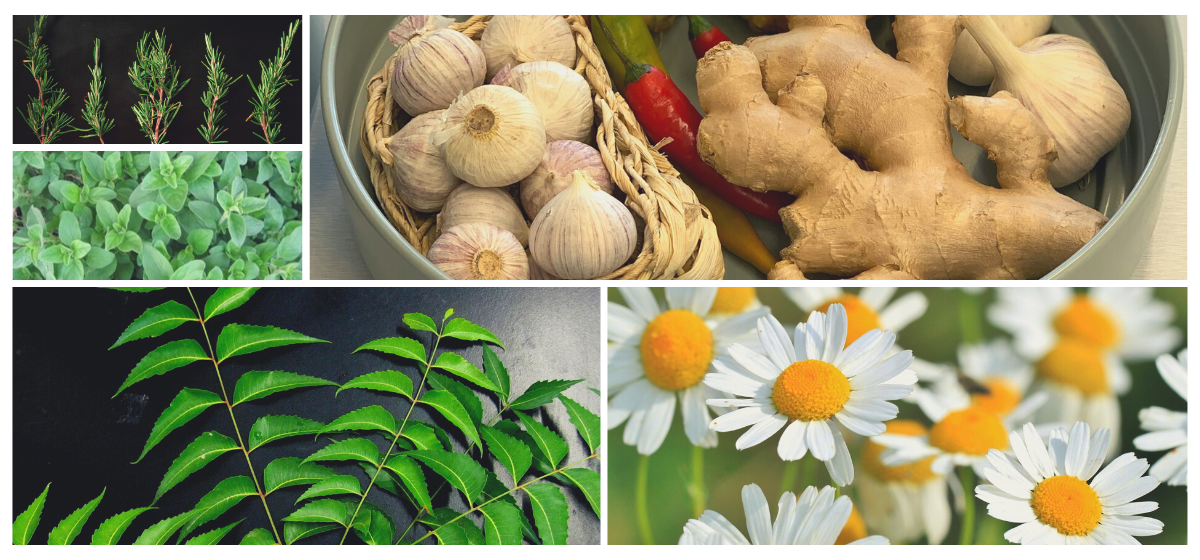9 Effective Antiviral Herbs In Your Kitchen
A virus is a tiny infectious agent that can only replicate inside the living cells of other organisms – people, animals, plants etc. Antibiotics are not effective in combating viruses. So the best bet is prevention.
Antiviral herbs inhibit the development of viruses. They can be used to treat infections and usually cause little or no side effects. Many antiviral herbs boost our immunity, allowing our bodies to attack viral pathogens.
The COVID-19 pandemic has stressed the importance of having a strong immune system. So we have curated a list of antiviral herbs that can prove beneficial during these times:

1. Ginger
It is said that ginger helps resist viral infections by increasing the body’s temperature. It also helps flush out toxins from your body. It can be consumed in various forms – fresh, dried, powdered in our daily food and tea. How do you like to use this antiviral herb in your diet?
2. Garlic
Another popular herb available in every household is garlic, popularly known for its antiviral activities against infections such as influenza A and B, viral pneumonia, rhinovirus and more. Studies have indicated that garlic stimulates protective immune cells, hence boosting our immunity.
To get the most benefit out of garlic, it is best eaten raw. Many suggest eating a clove or two soon after waking up.
3. Aloe vera
Known as the “plant of immortality” in ancient Egypt, aloe vera has been used for a variety of medicinal purposes all over the globe. It is used for treating wounds, to fight inflammation, as a laxative, etc. Further, it has antiviral and antibacterial properties, too.
Aloe vera plants are hardy and easy to grow in containers. You can read more about preparing, extracting and consuming aloe vera gel here.
4. Neem
Neem can constrain viruses from multiplying and spreading which makes it ideal for antiviral and antibacterial treatments. A paste of neem leaves is used directly to heal skin infections. Consuming neem capsules or using a few leaves in tea is beneficial.
5. Rosemary
Like peppermint, rosemary is also a member of the mint family. It has antioxidant, antiviral, anti-bacterial and anti-carcinogenic properties. It eliminates harmful bacteria while leaving helpful bacteria undamaged. Rosemary brings aroma and flavour to dishes and its essential oil has various uses.
6. Basil
Basil, both sweet and holy varieties, may effectively fight viruses and infections such as mouth ulcers and acne. Holy basil, commonly known as tulsi, strengthens the immune system which in turn protects us from viral infections.
7. Oregano
Also a member of the mint family, oregano is way more than just delicious seasoning. Carvacrol, a compound present in oregano, is known for its antiviral activities. Studies have shown that carvacrol exhibit antiviral activity against HSV-1, rotavirus and respiratory infections.
8. Peppermint
Peppermint is commonly used to make teas, extracts and essential oils. The menthol and rosmarinic acid present in peppermint exhibit antiviral and anti-inflammatory properties. Peppermint can also improve allergy symptoms, headaches and clogged airways.
Peppermint tea makes a refreshing caffeine-free drink that can be enjoyed at any time of the day.
9. Chamomile
Chamomile has been used as a herbal remedy since the time of Hippocrates in 500 BC. Chamomile flowers contain more than 120 chemical constituents including apigenin, that acts as an anti-inflammatory, antioxidant, antibacterial and antiviral.
Chamomile tea helps ease inflammation, spasms, and indigestion, promotes calm and sleep, and protects against ulcer-causing bacteria.
Check out our range of peppermint and chamomile based herbal infusions.
Buy Here
We hope that this list was beneficial. Click here to read about the health benefits of some of the most commonly found healing herbs.


